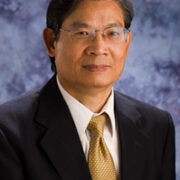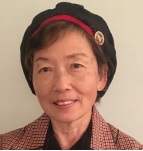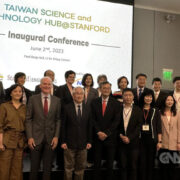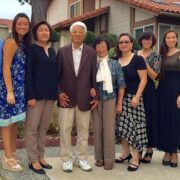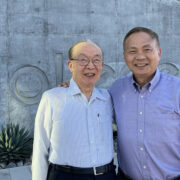Christianity on the 21st Century—–An Introduction to Eternal-Now Theology
By Kent C. Lin 林建中
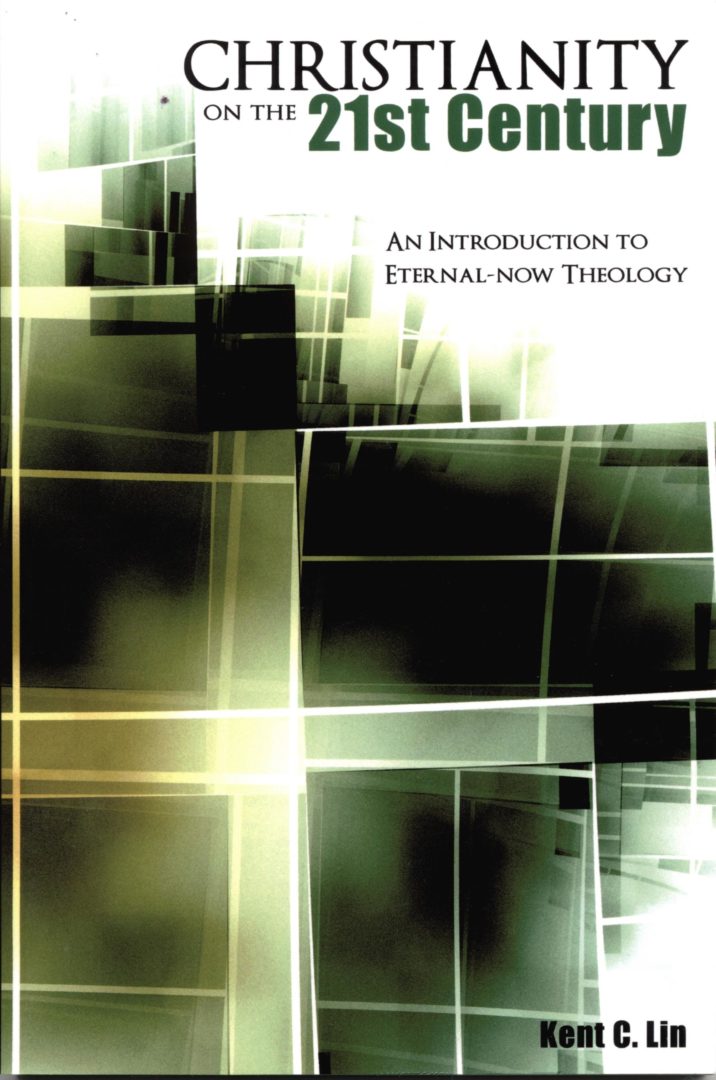
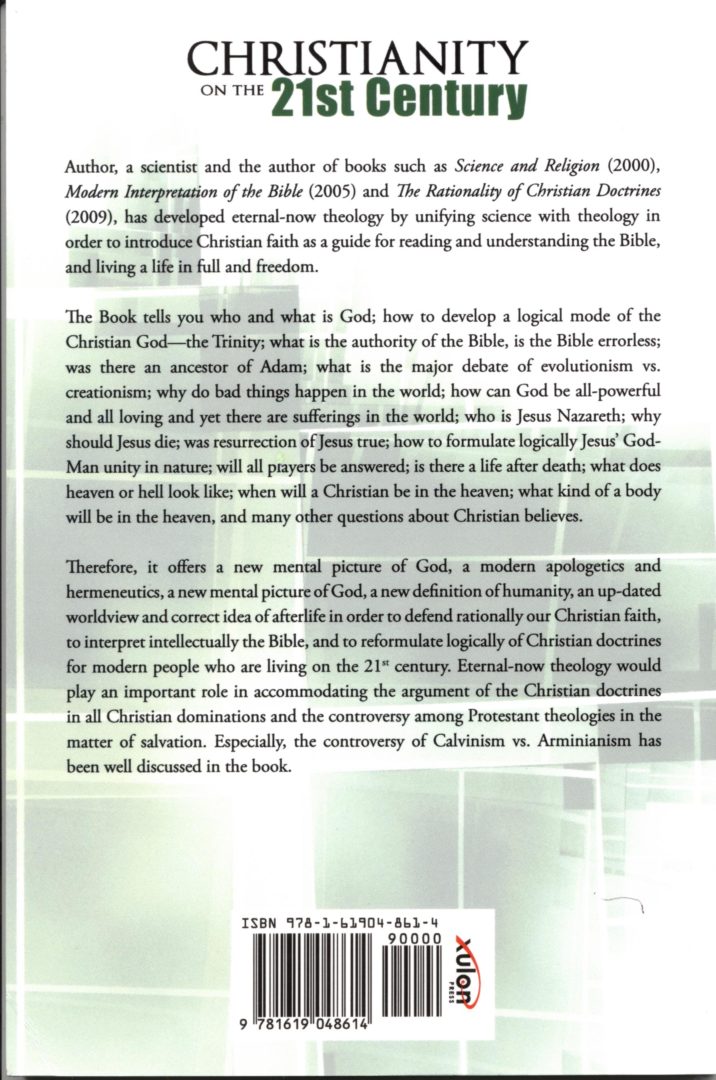
Prologue
Rationally and intellectually thinking, a religious faith is very real and important to a human life. At all different times and places in our lives we have each found ourselves in questioning aspects of our religious faith and worldview. By the late seventeenth century, philosophical and scientific rationality known as the ‘Enlightenment’ in Western world encouraged analytical mode of thought to the modem Christianity. In fact, modem Christian theology has become more rationalism rather than mysticism.
Therefore, it is the crucial task of theologians in the age of science to reconcile the tension between scientific rationality and Christian faith by unifying science with religion. Indeed, science has big influence on the thought of Christian theologians especially in this age of science. Theology without science might be insufficient to recognize the insight of God. To the contrary, science without theology might be inadequate to search the truth of God.
Faith in God must be believed, since it is neither empirically evident nor schematically provable. Nevertheless, this does not mean that truths of faith are incomprehensible and irrational or above ‘logic.’ I feel confident that Christian faith must be built on the basis of the true knowledge of God and the intellectual rationality of Christian doctrines in order to prevent Christianity from idolatry and religiosity.
By unifying science and religion, I developed a new theological paradigm, which I call eternal-now theology, which is based on trirealism in place of dualism or monism, to provide a modem apologetics for Christian faith accounting what we believe in God or why we ever find our Christian belief to be credible in this modem age. My theological attitude is that UI should know in order that I may believe” rather than “I should believe in order that I may know.”
In eternal theology, I propose the providential worldview in place of traditional deterministic worldview in order to explain all events happening in our real world. Moreover, I utilize the scientific formulation methodology – a kind of scientific language for writing and formulating——to our new hermeneutics and apologetics throughout this book.
That effort resulted in my previous book: The Rationality of Christian Doctrines by Kent C. Lin, Xulon Press (2009). Finally, this edition is written in brief as the concentrate of that previous book and entitles Christianity on the Twenty-first Century and has the subtitle An Introduction to Eternal-now Theology. This book is English version. Chinese version of the book was already published by Wunan publisher in Taiwan in June, 2011.
We know that the Bible is not a preordained script. There are approximately 40 men of authors of diverse background over the course from about 1,400 BC to the end of first century in human history. One generation could respond to the Bible in the different way with another generation. In fact, there could be no definitive interpretation of the Bible. Even great scholars differ over the exact interpretation of certain passages in the Bible.
Therefore, we need a modem apologetics, a modem hermeneutics, a new mental picture of God, a new definition of humanity, an up-dated worldview and correct thought of afterlife in order to defend rationally our Christian faith, to reinterpret intellectually the Bible, and to reformulate logically of Christian doctrines for modem people.
Western Christianity has split into Roman Catholic and Protestant in the sixteenth century. Each has developed its own theology. Even the Protestant reformers soon disagreed among themselves and divided their movement according to doctrinal differences—first between Martin Luther and Ulrich Zwingli, later between Martin Luther and John Calvin and between John Calvin and Jocobus Arminus—and consequently resulting in the establishment of diverse Protestant denominations such as the Lutheran, Reformed, Presbyterian, Anabaptist, and others.
In this view, eternal-now theology may play an important role in accommodating the argument of the Christian doctrines in all Christian dominations and the controversy among Protestant theologies in the matter of salvation. Especially, the controversy of Calvinism vs. Arminianism has been well discussed in this book.
At this point, I am neither a fundamentalist nor liberalist. I am a Christian with scientific rationality. Personally, I possess no longer orthodoxy tradition, which asserts inerrancy of the Bible and insists on deterministic worldview. I do not wish to imply by this that the Bible is not a sufficient basis for Christian belief. Yet it is also true that many sources out of the Bible; modem science and philosophy especially are devoting to explore a new area of apologetics for this age of science.
Indeed, Christian theology takes the account of God whether legendary or philosophical to every generation. For example, Greek Platonism made dominant influence on Christian theologians of the early church. On the other hand, modem science affects much the irrational mysteries of traditional faith. To greater extent than other religions, Christianity has advanced theology by transferring mysticism into cultivated religion since the early middle Ages.
In etemal-now theology, I propose the providential worldview in place of traditional deterministic worldview in order to explain all events happening in our real world. Moreover, I adapt and utilize the scientific formulation methodology—a kind of scientific language to write, read, formulate and explain hermeneutics, apologetics and Christian doctrines throughout this book.
In Part One of this book, it offers the foundation of Christianity. Jews and Christians treat their scriptures (i.e., the Tanak for Judaism and the Bible for Christianity) with ceremonial reverence. Christians believe in the Trinity rather than Jewish Yahweh or Islamic Allah (A-la). By this section, eternal-now theology is introduced in order to offer a modem apologetics.
Readers are to be recommended to refer to the Appendix A and B prior reading over the context of this book so that you can utilize the scientific formulation methodology to exegete the Bible and formulate Christian doctrines.
In Part Two, Christology tells us that Jesus was a historical person and Messiah as well. He was the Divinity-Humanity equilibrium in nature to serve as Christ when he had lived in this world around two thousand years ago. You would come to recognize the validity of Christology even in this modem era.
In Part Three, it makes mention of the distinction between the supernatural and natural realms from theological point of view. Then we discuss about the essence of a Christian life within eternal-now, which is promised by Jesus Christ to let us to have a life to the full as human persons during this earthly life and to live spiritually as gods etemal-now with God in the heaven after death.
It is my hope that this book may offer a new source of getting the true knowledge of Christian God and gaining the essence of Christian life to the full in Jesus Christ for people who are living on the twenty-first century. It is written in English and Chinese versions in order to share Christian gospel with more people including Christian and non-Christians as well as theism and atheism around the world.
Kent C. Lin in New Jersey January 1st, 2012
About the Author
 Christmas Day, 2010 in New Jersey
Christmas Day, 2010 in New Jersey
Chen-chong Lin, Prof. Dr. rer. nat., FABI, MD; LFIBA, DDG
Chen-chong Lin (known as Kent C. Lin) was born in Chia-yi, Taiwan in 1927. He finished his college education (BS) in Chemical Engineering at National Taiwan University in 1951. He gained his MS in Doshisha University in Japan in 1958 and got his doctorate (Dr. rer. nat.) in Technical University Munich in Germany in 1965.
He married Ya Shue Tsai, a piano Professor in the National Normal University, Taipei in 1958 and they have two sons, and one daughter. He immigrated with his family to the United States in 1977.
After he worked as a researcher in some governmental Industrial Research Institutes, he was full time Professor of Chemical Engineering and Material Science at the three Universities—National Taiwan University (1966-1981) in Taipei, Taiwan, New Jersey Institute of Technology (1982-1988) in Newark, USA and National Chiao-tung University (1988-19 in Taipei, 97) in Hsin-chu, Taiwan.
He was a Research Follow of the UN Atomic Energy Agency in Tokyo, Japan (1959-1960), a Humboldt Research Fellow at Technical University in Munich, Germany (1967-1968) and a visiting professor at Louisiana State University in Baton Rouge, USA (1979-1980).
During his career in education and research he published over 180 technical papers covering the fields of Chemical Engineering and Materials Science and Engineering. He also wrote several college textbooks. His first textbook is The Principle of Polymer Chemistry (1970). His latest textbook is Nanotechnology: basic and practice (2005).
He became an Eminent Fellow (FABI) of the American Biological Institute, Inc. in 1994 and received the International Cultural Diploma of Honor as Magnificent & Distinguished (MD) in 1995 and Presidential Seal of Honor in 1996. He has become an Honorary Member of the International Biographical Association (Cambridge, England) as a Life Fellow (LFIBA) in 1995, and has been appointed as a Deputy Direct General (DDG) in 1996.
For his religious life he was baptized as a Christian on August 22, 1954 at Ton-mng Presbyterian Church in Chia-yi. He had served as an elder at Chong-lung Presbyterian Church in Taipei for 15 years (1967- 1982).
Since his retirement from his teaching and research career in 1997, he began to write on the subject of religious philosophy. As the product of these international relations and cultures, his understanding of Christianity is rational and intellectual. He is himself convinced that Christian faith must be built on the basis of true knowledge of God and the rationality of Christian doctrines.
He is the author of books: Abundant Life (1989), Science and Religion (2000), Modern Philosophy of Human Life (2002), Modern Interpretation of the Bible (2005), 80-Yearfs Recollections of Chen-chong Lin (2007), The Rationality of Christian Doctrines (2009). Christianity on the 21st Century (Chinese Version) (2011).
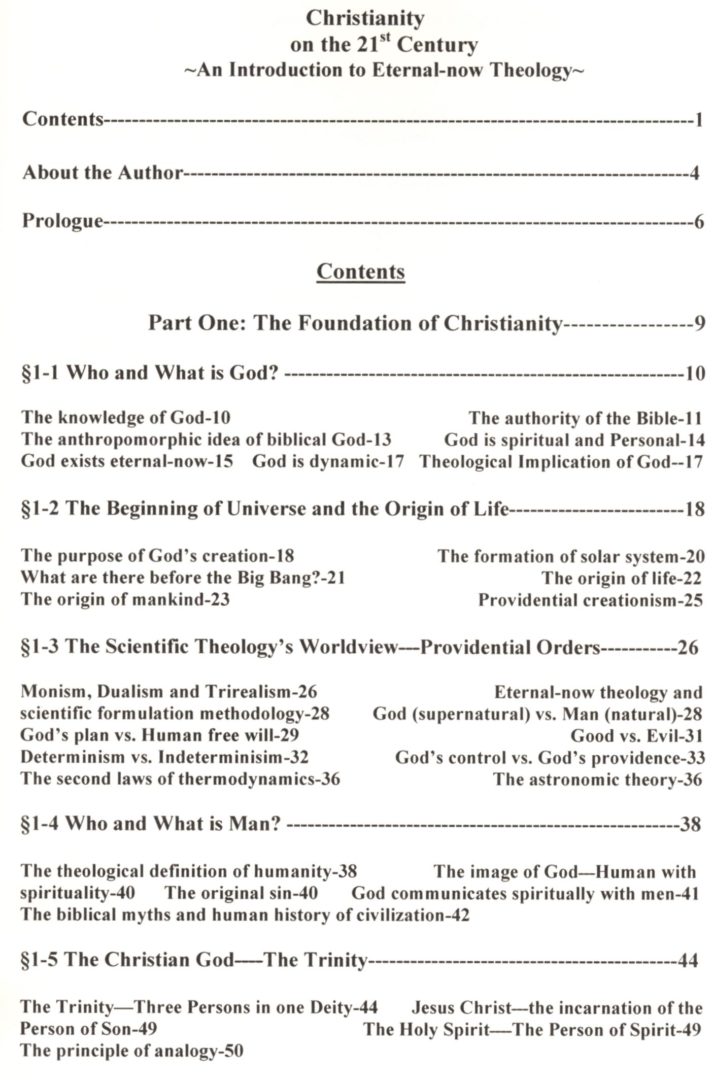
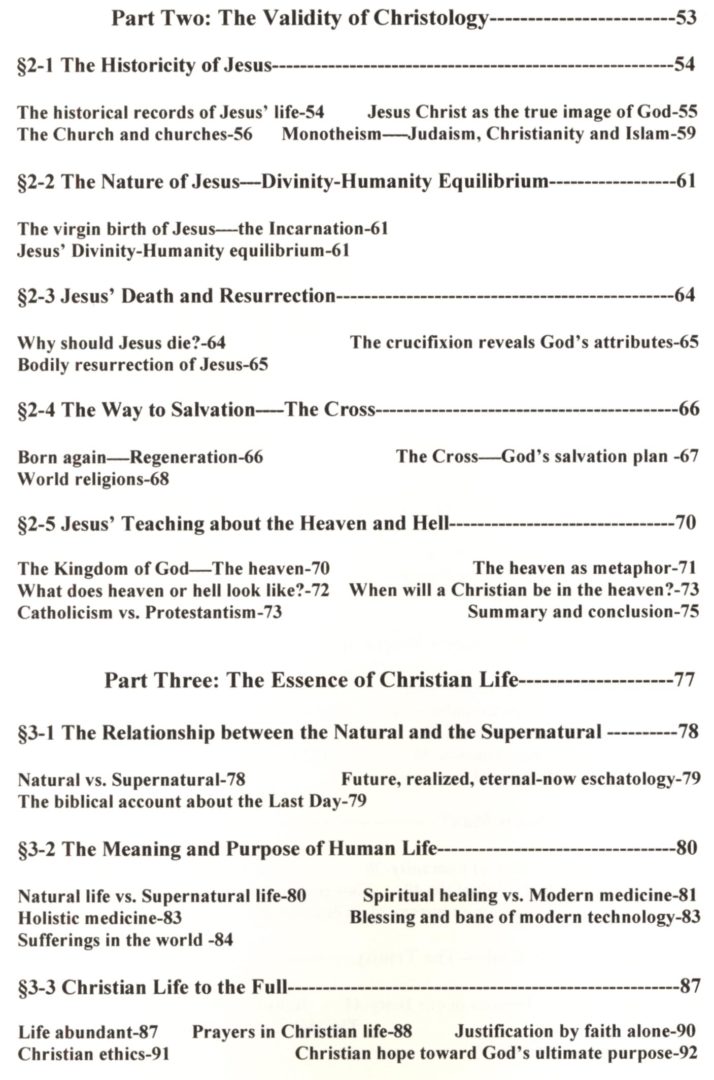
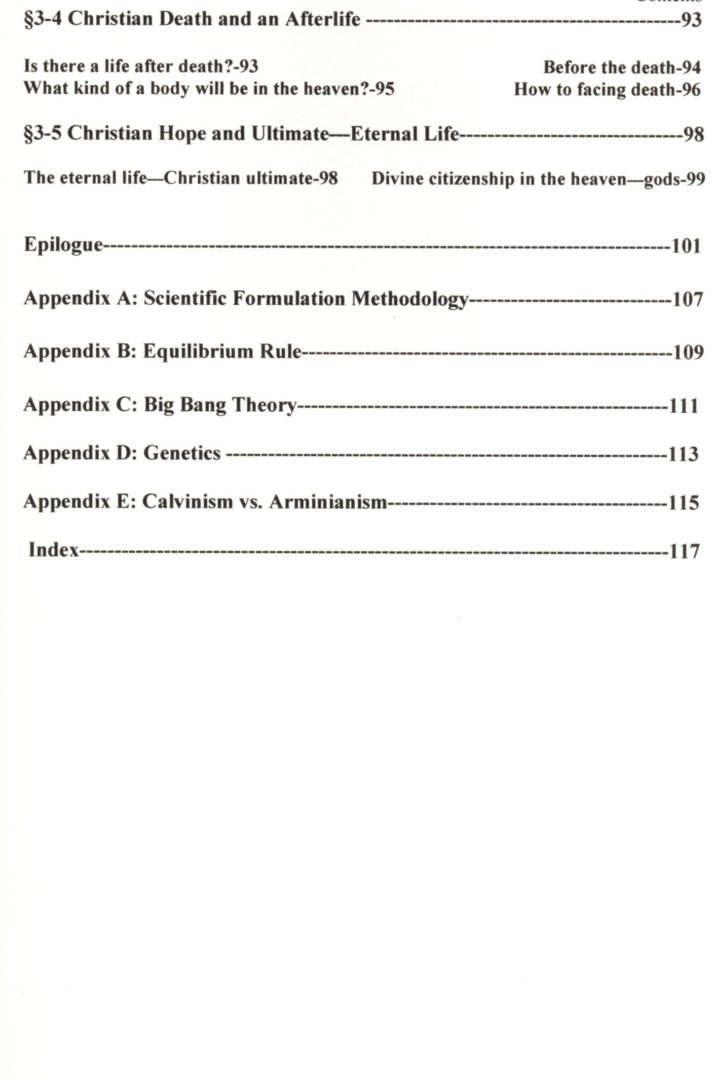
Published in -/2011
Donated by Prof. C. Lin 01/2018
Posted in 01/2018

